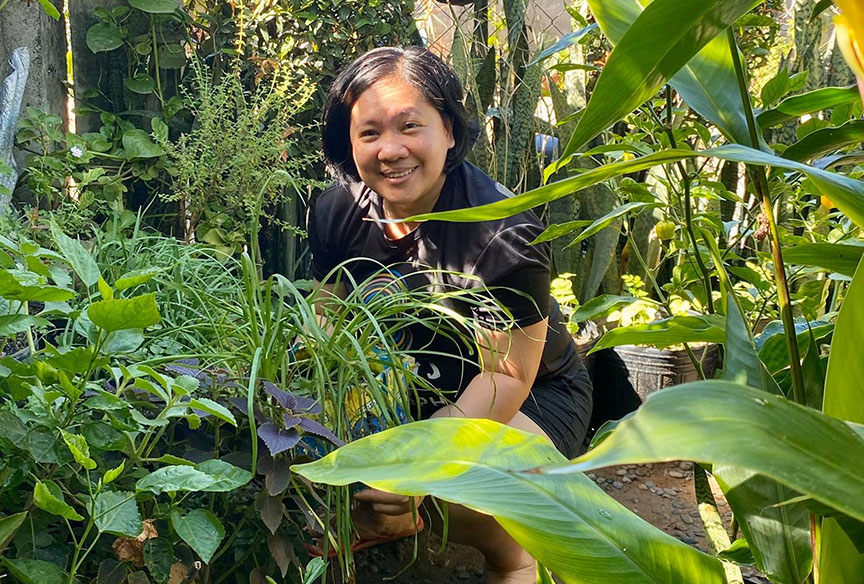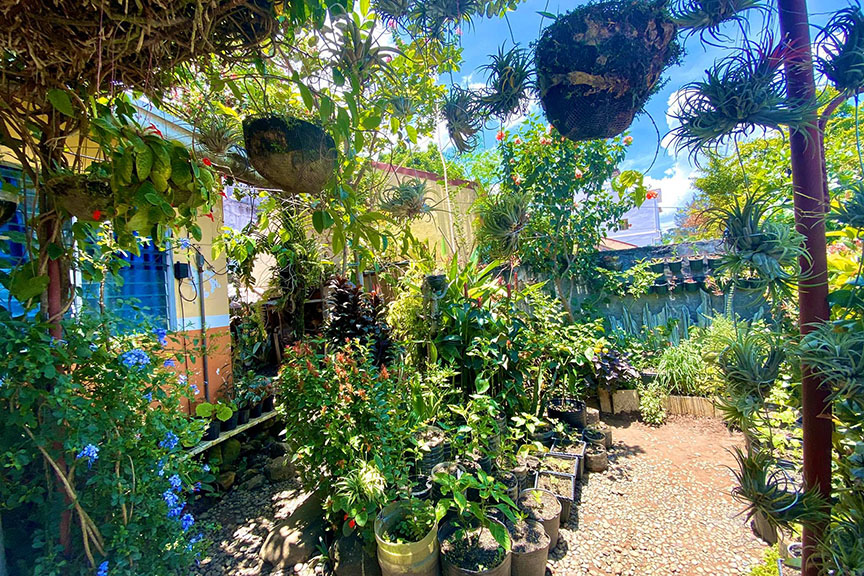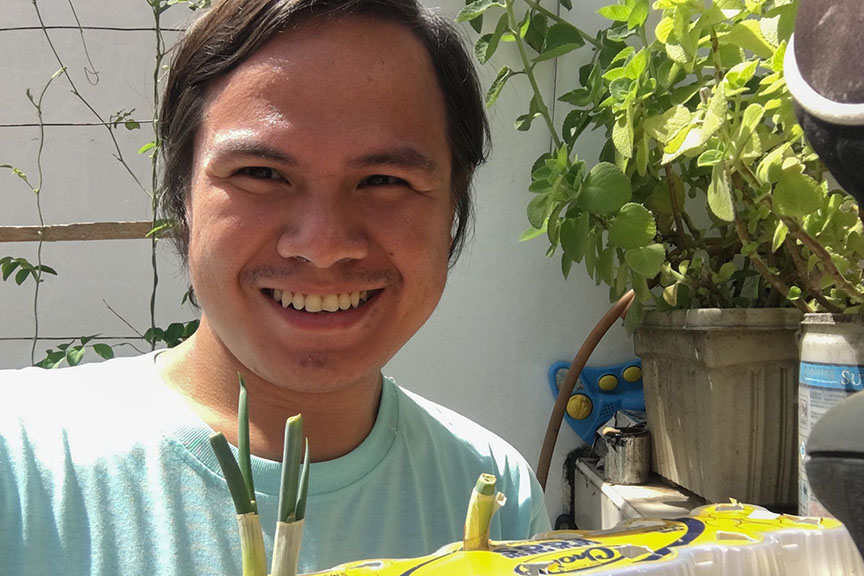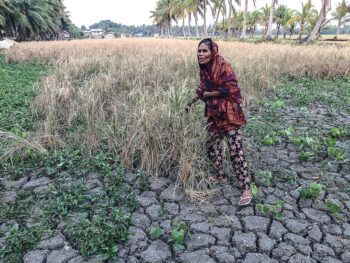DAVAO CITY (MindaNews / 22 April) – Weeks of being put on quarantine can take a heavy toll on most people who are restricted from leaving their homes. But some crafty professionals have found other ways to get both their minds and hands busy amid the coronavirus disease (COVID-19) crisis through urban gardening while working from home.
 Environmentalist Chinkie Golle, executive director of Interface Development Interventions (IDIS), enjoys more time tending to her family’s urban garden during enhanced community quarantine. Photo courtesy of Chinkie Golle
Environmentalist Chinkie Golle, executive director of Interface Development Interventions (IDIS), enjoys more time tending to her family’s urban garden during enhanced community quarantine. Photo courtesy of Chinkie Golle
Environmentalist Chinkie P. Golle, executive director of Interface Development Interventions, said she got more pots for her vegetable seedlings and ornamental plants to while away her time during the community quarantine as a way to de-stress, grow their own food, and marvel at the sight of their beautiful garden.
“I love all of them because of the positive energy they give. Our garden is my main stress reliever. I love to look at every plant, appreciate their colors and feel the oxygen they produce. When we sit in our garden, we can feel the coolness of the air. It really feels good to be surrounded by plants,” she said.
Golle said the lockdown allows her more time to tend to her 56-square meter garden where she maintains a variety of ornamental plants, and grows crops, vegetables, and herbs such as herba buena, mayana, oregano, mint, tarragon, chives, aloe vera, ginger, chili peppers, and turmeric.
She said she got most of her plants from friends, colleagues, schools, and winners of Lunhaw Awards, an annual recognition given to groups and individuals in areas of sustainable environmental and agricultural initiatives.
 Chinkie Golle’s lush garden at home. Photo courtesy of Chinkie Golle
Chinkie Golle’s lush garden at home. Photo courtesy of Chinkie Golle
Golle’s interest for urban gardening sparked after she and her husband had moved to their home in 2009, starting with their small backyard then making use of the throwaway vegetable and native chili pepper seeds.
“I have to make sure we have native chili pepper because hubby likes spicy food,” she said.
As an environmental advocate, Golle wanted to show people that she walks the talk, putting her environmental advocacies into practice at home to make them see “we have a beautiful green space.”
“We are not yet self-sufficient but because we have planted vegetables, we can always get or harvest from our garden and cook it. We have alternative source of food – vegetables and chicken – organically grown and healthy,” she said.
Golle said newbie gardeners could start with any plant they like, be they ornamental or edible plants.
“Plant what you like or love and what you need in your garden. If you love ornamentals, plant it. I have seen a lot of people making their backyard beautiful and they also feel beautiful and they earn a lot from their ornamental plants,” she said.
Golle added that gardening can be rewarding and can earn them extra income, too.
“I also know and have seen a lot who love to plant vegetables and I think they are great because they are producing their own food and even increase their income from it,” she said.
Her piece of advice for those who are planning to start their own urban garden: produce their own organic fertilizers and pesticides through composting to make their harvest safer for consumption and minimize the production of biodegradable wastes.
“For people with small spaces like ours, we can maximize our area by planting both at the ground and also in pots. In our garden we use both, recycled plastics as our pots and also the pots that are sold,” Golle said.
 Rob Gumba develops his interest for urban gardening as he landed his job as a journalist in Davao City, covering agriculture and agribusiness stories. Photo courtesy of Rob Gumba
Rob Gumba develops his interest for urban gardening as he landed his job as a journalist in Davao City, covering agriculture and agribusiness stories. Photo courtesy of Rob Gumba
Davao journalist Rob Gumba said he could now tend to his crops, watering them and keeping the weeds out, aside from doing his regular household chores and beating his daily deadlines.
“I am still working from home. What I can only do is more on watering and weeding – things that are not time-consuming,” he said.
Gumba developed his interest for gardening from his mother as he grew up seeing her plant a variety of vegetables and fruit trees, including, among others, okra, eggplants, malunggay, atis and guyabano.
“Meanwhile, I plant mung beans in another corner and used empty sardine can. Also, my Lolo maintained a larger vegetable garden. He had kamatis, pechay, eggplant, okra, kangkong (water spinach), malunggay, and many others,” he added.
Gumba’s love and appreciation for urban gardening grew even bigger when he moved to Davao to study and later landed his job as a journalist, covering agriculture and agribusiness stories.
“Here in Davao, we really do not have soil to plant with vegetables. So I asked my Papa to make me a small planting box, which is currently planted with blue ternate and mint. In another corner, there are empty milk cans being planted mostly with ornamentals,” he added.
Gumba’s personal favorite? Blue ternate since it is easy to maintain.
“Based on a planting instruction, the seeds should be soaked in water for a few minutes before it is buried in soil. But my Papa directly put them in the soil. It still survived,” he added.
Gumba plans to plant eggplants and tomatoes in his garden soon because these “resilient” plants can survive in the harsh environment, and he can cook several scrumptious dishes with them.
“I like grilled tomato so having more tomato in front of our house means more grilled tomato for me. Basically, I base my preference on what I can eat without rice,” he added.
Gumba said he does not really adhere to strict planting guidelines, but suggested that it is better to have the seeds grow in separate medium-sized containers before replanting them on bigger ground to give the plants bigger chance of survival.
“I also learned, as far as my blue ternate is concerned, do not use clay soil. Choose the type of soil that can allow plant to take root, allowing them to move as the plant grows. You can use garden soil or maybe mix with some sand. Then, I think the most important part is not to miss watering it, especially vegetables,” he added.
Gumba said growing food saves time and money because he could just pick from their garden, not to mention the joy of seeing the new plants bear fruits.
He said urban gardening could be rewarding since the materials to start one are just within reach. Many of them can be found at their home, such as containers, soil, food scraps for fertilizers, internet to learn planting techniques, and vegetable seeds.
“It only takes the interest, resourcefulness, and diligence to actually do it and maintain it. And sometimes, interest springs and grows when they start doing it,” he added. (Antonio L. Colina IV / MindaNews)
